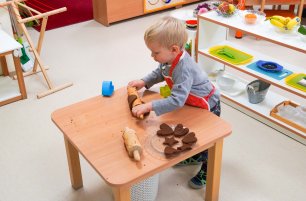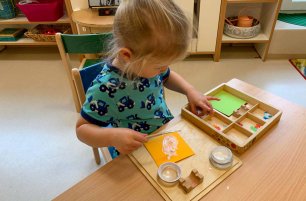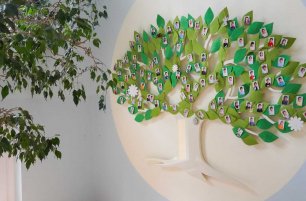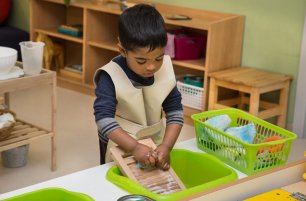The toddler who won’t
We all know the scene: a frustrated parent, a child that refuses to listen and do as they’re told, the fight that no‑one wins.
Over and over, the child who will just not stop – the one‑year‑old who keeps pulling the curtains down and trying to climb furniture, the two‑year‑old stopping every two meters on their walk to collect small rocks, the three‑year‑old drawing with markers on the wall and the sofa … no matter how many times they’re told no, no matter what threats or punishments meet them.

What gives, and how can we avoid these battles?
All these situations might have one thing in common: a young child so deeply absorbed in an activity that in the moment they cannot help but blindly follow the compulsion. This is a marker of what Maria Montessori called the “sensitive period” – a specific phase in the child’s development, during which the child is so attuned to a particular aspect of the environment that exploring it and carrying out some kind of activity with it be‑ comes the absolute most important thing to them.
Why is this?
There is a cyclical nature to human development, which is something Maria Montessori observed, and modern psychology confirms. Instead of “steadily working on everything”, the human brain goes through these sensitive periods when it needs a particular kind of stimuli in order to learn a new skill, concept, or activity. And when it gets it, it becomes the top priority to take advantage, before moving onto the next thing. In the middle of a sensitive period, the child (not knowing why!) Will defend themselves every way they know how – some with tears, some with force, some by sneaking around, some with blind persistence.
So, what can we do?
First of all, we can stop acting frustrated. Knowing that the child is acting to fulfill a vital need can (and should) transform the situation in our eyes from annoying to amazing! And even more importantly, we now know that whatever the problem is, it won’t last forever; sensitive periods come and go, and so do their manifestations. Still though, we can’t let the baby climb onto the coffee table, we want to walk at a reason‑ able pace, and we certainly deserve to have walls that are not covered in crayon masterpieces. But we can redirect. If we succeed in offering the child something that fulfills the same need, there will no longer be any point in pursuing the inappropriate way: we can find a compromise that both sides are happy with.
What does it look like in practice
-
Stopping every few steps to examine the ground. This is a healthy and valuable exploration for a child in the sensitive period for small objects. Compromise – when in a hurry, you can try racing your child or turn their attention to trees and cars ahead; but when you have the time, get down and collect those tiny rocks right with them.”
-
Climbing on drapes and furniture. Again, a young toddler just needs to climb! We can show them how to climb on and off the couch safely, take them to the gym, take a walk over un‑ even terrain outside, crawl over cushions together (and tie the curtains up and out of reach until this peri‑ od passes)
-
Scrawling on walls and tables. All this child needs is lots and lots of paper, and perhaps sometimes also a parent who sits next to them and draws too, showing them how to use the pen and paper properly.
By Michaela Tučková
Want to learn more? Read our next article:




